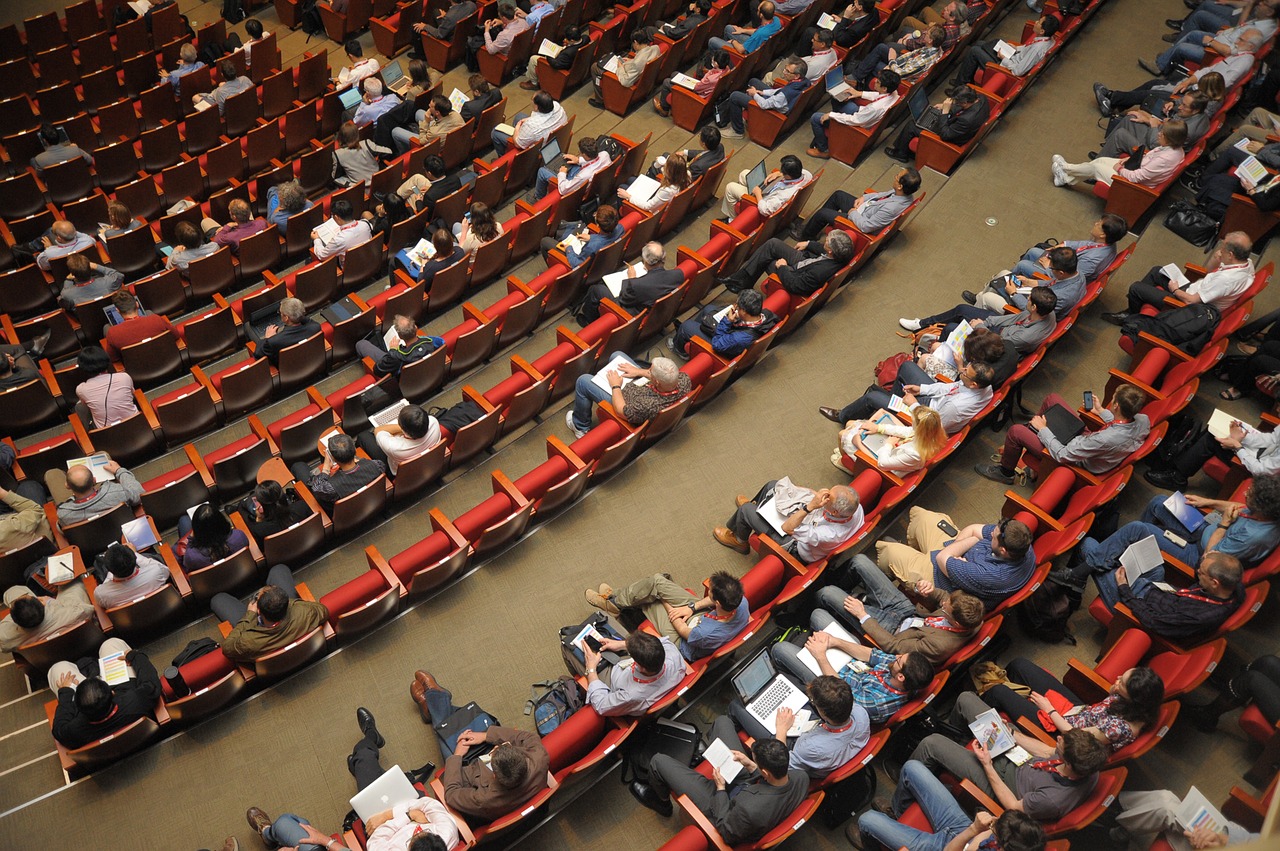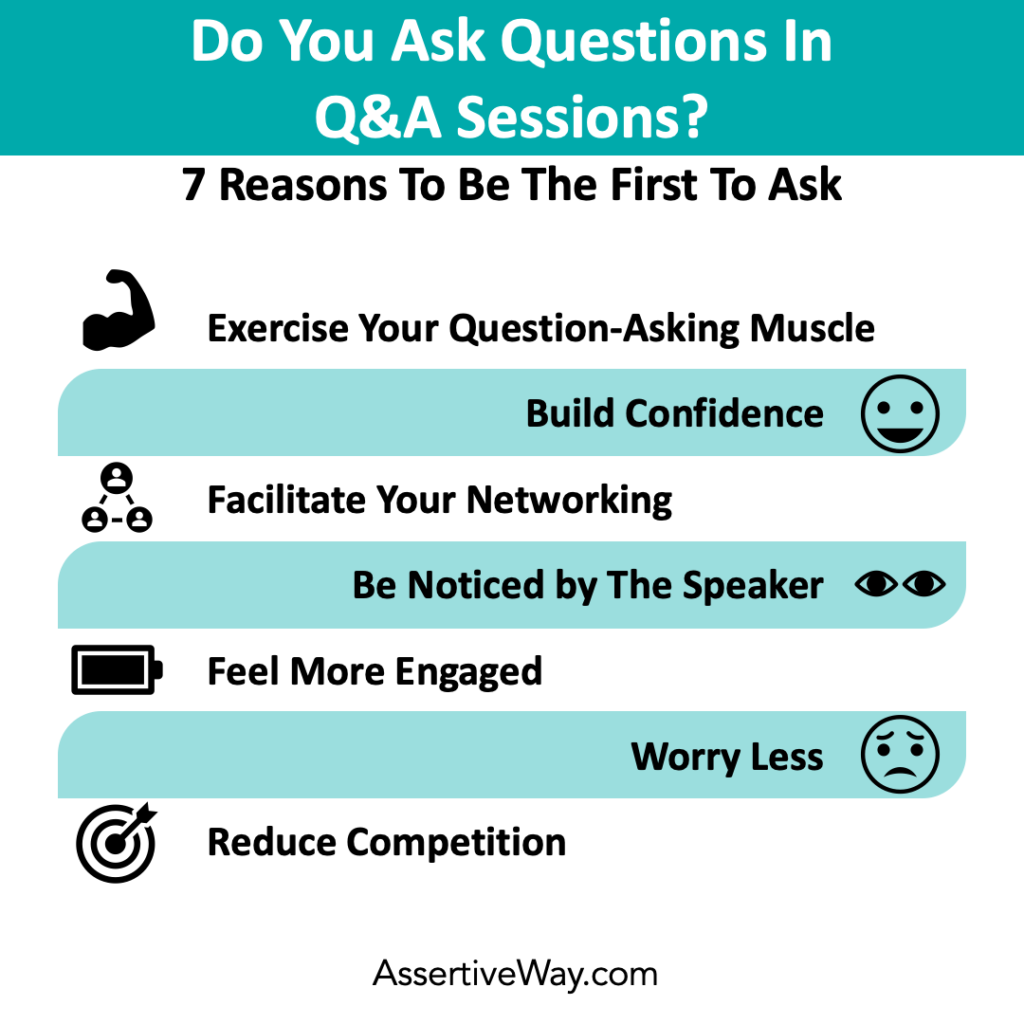7 reasons to be the first one to ask a question.

By Assertive Way
INTRODUCTION
What kind of person are you in a Q&A session when the speaker asks: “now we are going to open up for questions, who has a question”?
- You open up the Q&A session with the first question
- You wait for others to ask a few questions, then you ask your question
- You wait until the end of the session and then go find the speaker to ask your question
- You usually don’t have questions to ask
In this article, I’ll cover the emotional roller coaster of asking a question in front of an audience and share 6 reasons to ask it early on.
THE EMOTIONAL ROLLER COASTER
I’ve always loved conferences for their intellectual energy. They are like Red Bull for my mind. But I always felt anxious about participating.
My instinctive mode is to not ask any questions or to ask it to the speaker individually after the session. This remains true even after my MBA where I had to force myself to participate every day in a classroom of 60 students because it was part of our grading. However, in the last few years I’ve been training myself to do be one of the first to ask questions whenever I have an opportunity.
Asking questions is like a mini public speaking engagement. The emotional roller coaster and the adrenaline takes over. It is scary and exciting at the same time.
Asking questions is like a mini public speaking engagement. The emotional roller coaster and the adrenaline takes over. It is scary and exciting at the same time.
Here is the sequence of emotions that you may experience.
Overthinking your delivery
As soon the Q&A session starts and I’ve decided to ask a question, I start getting the chills down my spine. My legs start to tremble. I start to not be able to follow what is being said anymore.
I get anxious about the relevance and quality of my question, about using the right words to articulate it intelligently.
I feel guilty that I am taking the question slot from someone who has a more important question.
I rehearse my words in my mind, hoping that I won’t blank out as I ask the question or mumble non-coherent words. I especially rehearse the first few words, so I can “spit it out” and get it over with.
Deciding to stand or sit down
When I raise my hands, I do it a little low and I secretly hope they won’t call me.
When they call me, I ponder if I should remain seated to ask my question, but I force myself to stand up, even though I may expose my trembling that way. I get even more nervous when I think others can notice how nervous I am.
Trembling and speaking out loud
When they bring the microphone, I get anxious that others will see my hands shaking as I hold it. I also find my voice on the microphone very strange, especially when I am nervous.
If there is no microphone, I get anxious because I have to speak out loud. Otherwise the speaker won’t hear me with my soft voice. Speaking out loud makes me feel like I am yelling and being impolite. It feels very unnatural.
Fearing evaluation and judgement
Deep down I fear evaluation and judgement. I see my question as a performance. I see my question as a representation of how intelligent I am. However, it is more likely that another person has the same question than that someone will evaluate you. Plus, you will most likely never hear from anyone who does evaluates you, but you will hear from those who liked your question.
We fear appearing stupid in front of a large audience. We believe that asking questions is a sign of being less smart. To the contrary, asking questions is a sign of intelligence.
Wouldn’t it be more productive if I saw my question as a conversation starter? As an opportunity to capture more wisdom from the speaker? As an opportunity to connect with the speaker and the audience?
Calming down after the question
After I ask my question, I sit down still trembling. As the speaker answers my question, initially looking at me and then moving their eyes to the audience, I start to calm down. I feel relief. By the time the speaker moved on to the next question, I feel relaxed and a little accomplished.
Still to this day, I feel the stress of performance before a question. However, after my question, I can focus on the wisdom of the speaker and the connection with the group.
Reaping the rewards
Once the session ends, a stranger always approaches me and shares that they liked my question. It becomes a conversation starter. I go home feeling a little prouder of myself, and a little more confident.
It seems like an easy thing to do, but in my experience less than 5% of an audience asks a question.
Women are less likely to speak up at Q&As
Research suggests women speak-up significantly less than men in conferences and gatherings. And it is really unfortunate, because questions by women are a lot more likely to be in the minds of other women in the audience. Women may also have a different perspective on the topic.

7 REASONS TO PARTICIPATE AND BE THE FIRST TO ASK
1. You exercise your question asking muscle
So next time you need it, it’s not as difficult to do.
2. You build confidence
When you take action despite your fears, you realize the fears are not real. You realize that you are perfectly capable. You realize others valued your question.
3. It helps networking
There hasn’t been a single time I asked a question and wasn’t approached by at least one person to comment that they liked my question.
If you are afraid of approaching unknown people in these events, or if you don’t have a conversation starter, this can be a great one. You don’t need to do anything; others will do it for you. You already gave them a bait.
If an event participant is looking for someone to network with, in a crowd of unknown faces, who do you think they are more likely to speak to: a random person amongst hundreds or someone they noticed and heard speaking?
4. The speaker notices you
At the end of the session there are usually many people agglomerating around the speaker for questions. If you want to talk to the speaker, you have to compete and wait, instead of using the time to connect with other people in the audience. Sometimes the speaker just leaves, and you miss the chance of interaction.
The speaker will also be more likely to remember you if you asked a question. Especially if you asked the first question. The speaker is generally nervous and anxious when they launch the Q&A. They fear no one will ask a question which makes them feel like no one cared about their speech or presentation. If you asked the first question, you may have provided the speaker immense relief from that anxiety. Therefore, you will be remembered in positive light.
You can connect in LinkedIn or email with an introduction stating that you appreciate their answer to your question. They will immediately associate a face to you. That way, you will differentiate yourself from the crowds.
5. You feel more engaged
Even the best presentations can be boring. In this era of continuous digital stimulation, it is hard for anyone to focus 30min or 1hour on a lecture.
When you decide you will ask a question, you become more alert during the presentation. Your brain engages in the content as you seek associations and gaps to question later. This keeps you alert and increases your learning.
6. Less competition
It usually takes a few seconds after a Q&A opens for the first courageous person to put their hands up. Q&A usually have limited time available.
Towards the middle to end of Q&A there usually many hands up, and only a few get selected. You really need to stretch your hand up high and make eye contact with those selecting the people to have a chance.
Even if they select you, you might feel guilty because you are “stealing” the opportunity of someone else that you feel is more relevant than yours.
7. Less to worry about
You don’t need to listen to and process every question and answer that comes before you in light of the already nervous activity of coming up with your own question.
I’ve seen it many times before, same questions being asked because the person wasn’t listening.
To avoid that risk of repeating and the added complexity, just ask first.
It takes some getting used to the pre-participation chills. But the rewards of connection and confidence boost afterwards, make it worth it every single time.
CONCLUSION
Even though some Q&As are now done via the internet, the traditional stand up and speak is still the norm.
It takes some getting used to the pre-participation chills. But the rewards of connection and confidence boost afterwards, make it worth it every single time.
Strive for early participation, not for question perfection.
“Courage is resistance to fear, mastery of fear — not absence of fear.”— Mark Twain
